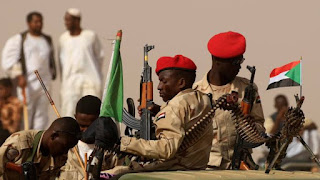Article from The Financial Times.com
By TOM WILSON in London
Published at FT.com on Sunday 20 June 2019
Sudan militia chief hires Canadian lobbying group for $6m
US filings show boom in such contracts between N American outfits and African governments
Photo: Soldiers wait for the arrival of Lieutenant General Mohamed Hamdan Dagalo before a meeting in Aprag village, 60 km from Khartoum, Sudan © Reuters
A feared militia commander in Sudan has hired a Canadian lobbying group he hopes will secure a public meeting with US president Donald Trump, support from Libya’s military leader and free wheat from Russia in return for an upfront fee of $6m
The consultancy agreement, signed in May by Montreal-based Dickens & Madson and Lieutenant General Mohamed Hamdan Dagalo of Sudan’s ruling military council, was published on June 17 by the US Department of Justice under the Foreign Agents Registration Act. It is the latest in a series of eye-catching lobbying contracts between North American companies and authoritarian African governments.s military leader and free wheat from Russia in return for an upfront fee of $6m.
For decades, lobbying outfits have served the interests of US businesses and foreign governments willing to pay for introductions and influence. Those companies are expanding their services, promising not only access in Washington but also mediation and dealmaking with third-party governments all over the world.
Matthew Page, a former Department of State official, said lobbying contracts between Washington groups and African states were proliferating because there was a belief that the Trump White House was more susceptible to external influence than previous administrations.
“This is a reflection of the changed political realities in Washington where the dynamics within the Trump administration are fundamentally different in terms of influence peddling,” Mr Page, who is now an associate fellow at Chatham House, a UK think-tank, said. “African governments have always had these types of lobbying firms helping them out but in the Trump era these firms can be more effective.”
Foreign governments, individuals and companies spent almost $1bn on US lobbyists in 2017, according to figures compiled by the Washington-based website OpenSecrets.org, a non-profit organisation which tracks money in US politics.
Services rendered have included securing press coverage for Cameroon’s 82-year-old autocrat Paul Biya, defending officials in the Democratic Republic of Congo from targeted sanctions or blocking the investigation of war crimes in South Sudan.
In Sudan, Dickens & Madson said they would attempt to influence US policy in favour of the transitional military council and help secure funding and equipment for the Sudanese army.
Lt Gen Hamdan and his fellow military officers seized power in April, toppling Omar al-Bashir, a long-term US enemy, following months of government protests. After promising to hand power to civilian rulers, the generals have demurred and in June turned their guns on the people, killing more than 100 civilians in a night-time raid on a pro-democracy sit-in.
The lobbying contract was signed on May 7, before the raid. But even then, Dickens & Madson faced an uphill battle to build US confidence in Lt-Gen Hamdan. Better known as Hemeti, the soldier who is second-in-command in the transitional military council and Sudan’s de facto leader, rose to national prominence as the head of a feared paramilitary group known as the Rapid Support Forces.
Members of the RSF have been accused of widespread human rights abuses in Darfur, western Sudan.
The lobbying group’s contract extends further than Washington. It will also push the interests of the Sudanese transitional military council in Russia, Saudi Arabia, the UN, the African Union and “any other mutually agreed upon country or countries,” according to the filings.
In Russia, the company aims to arrange “private meetings . . . with senior Russian and other political figures” and to secure aid shipments of wheat, diesel and animal feed.
In Libya, the goal is to win funding for the transitional council from military leader General Khalifa Haftar - another Dickens & Madson client - in return for Sudanese military support for the Libyan National Army.
Other objectives include meetings with Middle Eastern heads of state, US investment in Sudan’s oil industry and even the negotiation of an economic union between Sudan and neighbouring South Sudan, which seceded in 2011.
When contacted by the Financial Times, a spokesperson for Dickens & Madson said the company’s president who signed the agreement, former Israeli intelligence officer Ari Ben-Menashe, was travelling and could not be immediately reached for comment.

